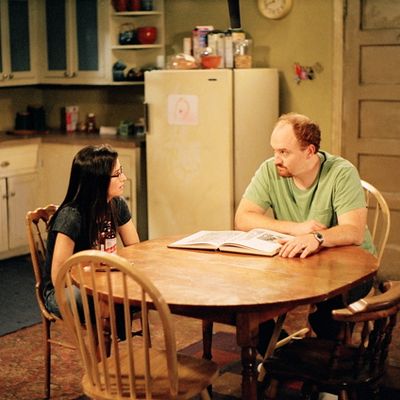
When Louie returns on Thursday, it’ll be showered with critical praise, the subject of a tidal wave of stories that chronicle Louie C.K.’s brilliance and creativity. And all of that adoration is deserved — the show really is that good. But Louie is not Louie C.K.’s first stab at a TV show. Back in 2006, there was the thirteen-episode HBO sitcom Lucky Louie that was not all the recipient of constant hagiography like Louie’s. While the New York Times called it “charming and funny,” Variety called it “wildly uneven,” EW gave it a C+, its Metacritic score was 48, and HBO — which rarely stops shows after just one season — did just that. Was Lucky Louie really that bad?
No! Nope, it was not. At the time, sure, it didn’t resonate, but in the years since, the comedy landscape has changed — and seeing the show through today’s C.K.-tinted lenses really helps. Now that you love Louis C.K., you’ll probably love Lucky Louie, even if you didn’t before.
On Lucky, C.K. played, yep, a guy named Louie. He worked at a muffler shop, his wife Kim (Pamela Adlon, now his unrequited love object on Louie) worked as a nurse, and they tried to make ends meet while raising their 4-year-old daughter, Lucy. They had some low-life friends (comedians Jim Norton and Rick Shapiro), some unusual friends (Laura Kightlinger and omnipresent sitcom everyman Mike Hagerty), and some omnipresent neighbors (Jerry Minor, Kim Hawthorne), just like a sitcom family should. Lucky was filmed on a stark set in front of a live studio audience and has all the rhythms of the most traditional multi-camera comedy imaginable. It’s sadder than a regular sitcom, bleaker certainly and more racy, but even though it was supposed to subvert the sitcom norms, it doesn’t really. In the ways that Louie is genre-defiant, Lucky Louie is a quintessential sitcom, all flat lighting and overtly stated premises.
The shows aren’t as different content-wise as you might think, though. All the seeds that grew into our precious Louie are there, as are the themes that C.K. still covers in his stand-up: the self-loathing and overeating, the combination of reverence for and frustration over women, the desire to be a good father, the eagerness to address race. The humor on Lucky is just like the humor on Louie: It starts out normal, familiar, mundane even — why are we bickering about something small? — and C.K. goes deeper and further with the premise, until suddenly we’re so far past rational that the big punch line is that in the heat of the moment, Louie calls Kim a “cunt.”
That’s actually the single biggest difference between Lucky and Louie: marriage. So much about Louie (and a good deal of C.K.’s current stand-up) is about being divorced, trying to date, being a father only half the time. Lucky is centrally about Louie and Kim’s marriage. It’s a relationship that always seems on the edge — in the penultimate episode, Kim moves out temporarily, and then she and Louie confess that they hate each other and always kind of have. This confession serves to reinforce their love, because all married people hate each other, and at least they knew that going in. It’s a sweet little moment, and it demonstrates that Lucky is just as solid a vehicle for C.K.’s perspective as Louie would be. Louie uses footage of C.K. doing stand-up, while Lucky more or less just is C.K. doing stand-up; many of the situations were lifted and reformatted from his act at the time.
Louie is certainly a better show than Lucky Louie (which is available on iTunes and on DVD). It’s more daring, more interesting, and it’s better written. It’s about more things. But Lucky Louie isn’t the weird misfire it seemed like in 2006. It’s a really compelling first draft.

